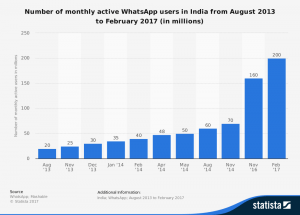Whatsapp messages: How accurate are they? According to the International International Journal of Scientific and Research Publications, there are 750 million Watsapp users in the world. And 20 million are added every month all over the world. That’s a lot!
In India alone, according to the Mashable Survey. There are 200 million WhatsApp users, and if we put these two statistics together, there is no doubt that the numbers of social media users in India are growing at a rapid rate. This is fantastic news! Information and media are being used by every person to communicate their thoughts, ideas, and messages efficiently. Advertisers, political, social, religious and other parties are promisingly using the social media to benefit them.
As consumers, of these messages, it is essential for all: children, the youth, and adults to be able to evaluate these messages. Three Questions to ask when you view a message:
- Why was this message/media created? [ Was it to educate me, persuade me, or entertain me]
- Who created this message? [ Marketers, Educators, Political or Ideological Parties]
- What values and points of views are embedded in this message? [Have they covered both pros and cons of the message]
Most messages on Watsapp are created without the author’s name. It is, therefore, crucial to know who the creator is. Is he/she an expert in the field? Is the information or media backed up by real evidence? Is he/ she trying to persuade you towards the object or idea?
What if your best friend sends you a message about a remedy that will help you lose weight quickly or some herbal concoction that will help improve our child’s memory? For an intelligent adult like you, it is imperative to make a rational decision and not jump on the bandwagon of believing everything you read to be true. The internet has all kinds of information, and it is up to you to make right decisions for you and your family.
Here is another example of the Plastic Rice video that went viral last year. There were questions all over India that plastic rice was being substituted for real rice. Nobody did a fact check, the blame game and fear of plastic rice spread virally, hurting the rice manufacturers, hoteliers, and others. What a shame! We thought wise to pass on the messages to help our friends and family – Did we stop to ask these three questions. Did we check the origin of this video? What we did was add fuel to the fire. Think, evaluate before you forward any message next time.
You will need to do a fact check and research on the information you have received before accepting it or forwarding it. Is there enough evidence to back the claim that is being made, if yes, go ahead and share otherwise PAUSE? Boomlive. In, Factchecker are some of the fact-checking websites, that can help you identify fake from real. Adding a Fact Checker Extn on your internet browser can help you check your facts.

